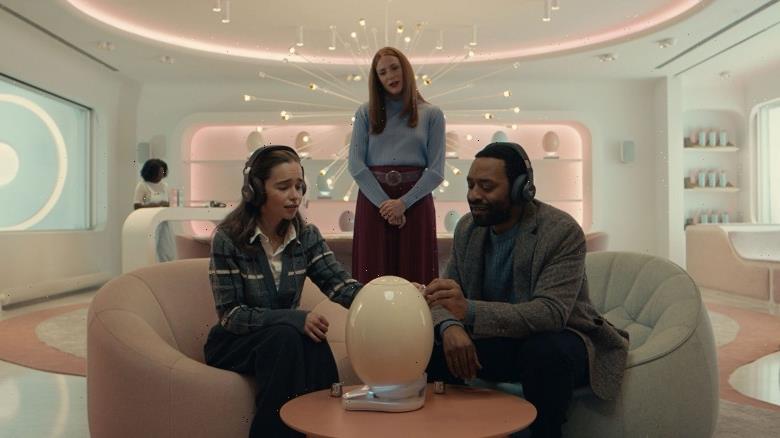In the 22nd century — somewhat amazingly — human existence has become so technologically advanced that certain things no longer seem necessary. Food comes from 3D printers. Nature has been reduced to something people experience through quick-hit “pod” immersions. Cities are the preferred location for nearly everyone. The sun is bright, outfits are crisp and tidy, and most people look sort of blissed out. It’s enough to fuel a closely tracked “Bliss Index,” which assigns an actual number to how happy the population is. It’s on the upswing and has been for a while.
Oh, and people — at least the people with enough money, some things really do never change — can grow their babies in smooth, egg-shaped pods that look like something Steve Jobs might have cooked up in a garage.
The pods aren’t exactly top of mind for Rachel (Emilia Clarke), who is struggling to find the time for a trip to those damn nature pods and has an A.I.-fueled super-Siri named Elaina constantly barking at her that she’s not quite happy enough (to say nothing of her “therapist,” another artificial being who exists only as a giant eye and the voice in Rachel’s head). But when the possibility of a pod is foisted on Rachel in “The Pod Generation,” Sophia Barthes’ cleverly constructed vision of a tech-mad utopia, everything changes.
And while that might sound straight-up dystopian and a bit scary, Barthes uses the same keen eye she brought to her 2008 feature debut “Cold Souls” to deliver an amusing, only somewhat terrifying vision of the future. It’s better! Or, is it?
When Barthes, who previously premiered “Cold Souls” at Sundance, introduced the film on the opening night of the 2023 Sundance Film Festival, she mentioned it was partially inspired by all the “weird dreams” she had while pregnant with her first child. And “The Pod Generation” is laced with plenty of dreamscapes, though none of them seem particularly odd in the context of her smart film — a compliment, because it shows just how wonderfully Barthes has pulled her audience into her latest creation.
Strong performances by both Clarke and Chiwetel Ejiofor, plus compelling production design from Clem Price Thomas (the pods and the wider world around them are instantly credible) recommend the feature, even if some of Barthes’ biggest ideas (she also wrote the film’s script) sometimes feel under-explored by the time the film reaches its conclusion. But the journey there is frequently funny and always immersive, and “The Pod Generation” seems ripe to spark conversations about just how much technology we want to let into our lives, now or in the future.
Rachel works for the company that makes “cognitive assistants” like Elaina (and her currently beta-testing successor, the big-eyeballed Masha), while her husband Alvy (Ejiofor) is a botanist, a job (really, more of a calling for the nature-loving dude) that others scoff at without a second thought. That all means that Rachel, as one of her own superiors sniffily reminds her, is the chief breadwinner. And she’s a good one, too, which means her company is eager to hold on to her and even more eager to ply her with perks.
Like expanding their family a new way: by helping Rachel and Alvy conceive a baby in a pod. It’s the latest rage! Initially touted as the next great step in feminism — why should women sacrifice their bodies and time and attention to grow an entire other human being — the pod emerges as just another way to manipulate the best and the brightest. For now, though, Rachel is besotted with the idea, enough to even convince Alvy, who unsurprisingly wants a “natural child,” to go along with the plan.
Other women in Rachel and Alvy’s orbit still give birth to babies the old-fashioned way, but getting a pod baby is the latest and greatest, and the couple should be pleased they’ve got this chance. At the dazzling Womb Center — one part Apple Store, one part The Wing — big boss Linda Wozchek (a bracingly funny Rosalie Craig) and her merry minions promise nothing less than a process that “solves childbirth.” Solves?
All of this is organized under the banner of Pegazus, a massive corporation that we slowly realize owns just about everything in the realm of “The Pod Generation”: not just Rachel’s company, but also the Womb Center, a new scheme involving international passports, and even the schooling of the country’s kiddos (our government stopped paying for education long ago, we’re told). Nefarious, surely?
But Barthes keeps things light, opting to focus her attention — and the charm of both Clarke and Ejiofor — on the promise of their baby. Soon, Alvy starts bonding intensely with the pod (the moment he starts referring to it as “the baby,” while Rachel reverts to “the pod,” it’s clear things have changed), and “The Pod Generation” becomes more concerned with classic conundrums and worries. What kind of world are Rachel and Alvy bringing their baby into? What will it feel like when the lil’ pod kiddo arrives? And can technology really “solve” the best thing humans are capable of? Big questions, surely, but “The Pod Generation” bubbles right along, finding a universal message in even the most out-there of stories.
Grade: B
“The Pod Generation” premiered at the 2023 Sundance Film Festival. It is currently seeking distribution.
Source: Read Full Article
